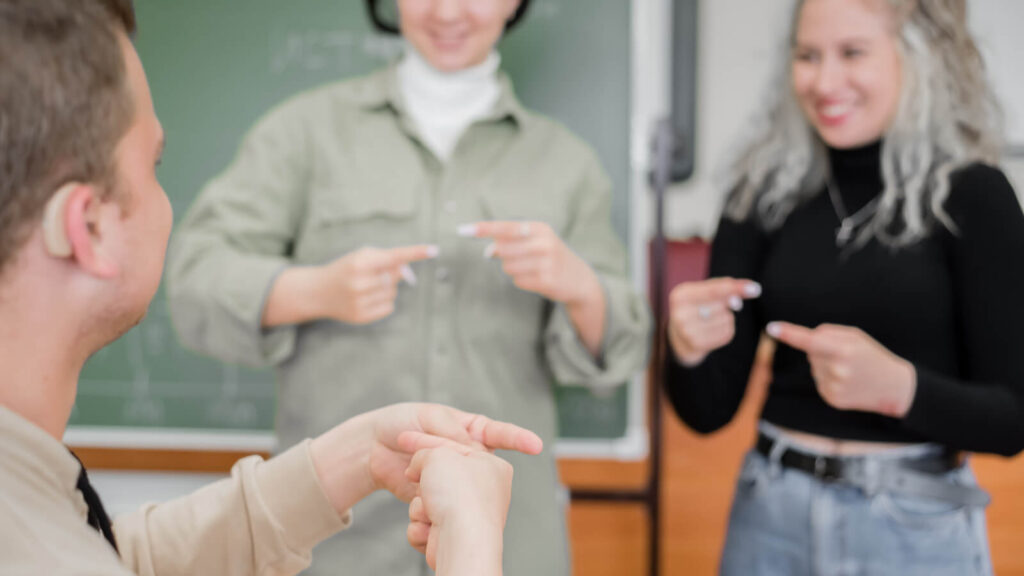
Department of American Sign Language & Interpreter Education
College of Education & Applied Human Sciences
Department of American Sign Language & Interpreter Education
College of Education & Applied Human Sciences
- EKU
- College of Education & Applied Human Sciences
- Department of American Sign Language & Interpreter Education
Turn Your Love of Language and People into a Rewarding Career
The department of American Sign Language (ASL) and interpreter education strives to promote equality and respect of Deaf, Deaf-Blind, and Hard of Hearing people and their diverse communities. Receive high quality ASL instruction and be prepared to be a professional practitioner who is a competent, ethical, life-long learner. Participate in an environment that promotes resources, partnerships, service, and scholarship to our community.
Learn More
Department of American Sign Language & Interpreter Education

Why Study ASL & Interpreter Services?
A rewarding career awaits graduates of EKU’s ASL programs. After graduating from our bachelor’s program, you’ll be equipped to provide skilled language interpreting for the Deaf. Or complete a minor in ASL and be prepared to communicate directly in ASL in your area of focused service and advocacy.
American Sign Language (ASL) is the indigenous language of culturally-Deaf people used throughout most of North America. Over the last 50 years, linguists have established that ASL is a complete, natural language that has a grammar, lexicon, and semantics that are fundamentally different from spoken English, or other signed languages used in other areas of the world. ASL signers from the Deaf community consider themselves to be members of a linguistic minority and their shared visual language is the heart of their unique visual culture.
ASL and Interpretation Learning Resources
We offer a number of resources to ensure students of our programs have an enriching and rewarding experience.
- Highly qualified teaching community comprised of a balance of both Deaf and hearing faculty and staff
- An outstanding ASL Language Learning Lab
- A state-of-the-art interpretation studio
- Statewide and nationwide internship placement
Statewide Partnerships and Stewardship
The department further carries out our mission of advocacy and support by providing a range of resources for our community and the Commonwealth of Kentucky. These activities include:
- Interpreter outreach resources and workshop training for professional interpreters
- Partnerships with key stakeholders such as the Kentucky Department of Education, Kentucky School for the Deaf, Administrative Office of the Courts and the Kentucky Office of Vocational Rehabilitation.
Mission
Our mission is to increase the equity, equality, understanding, and respect of deaf, deaf-blind, and Hard of hearing people and their diverse communities.
This mission is carried out by three inter-related goals:
- To provide high quality American Sign Language instruction.
- To prepare professional practitioners who are competent, ethical, and life-long learners.
- To promote excellent resources, partnerships, service, and scholarship to the Commonwealth of Kentucky, the region, and throughout the United States.
Values
Eastern Kentucky University’s core values are shared in the ASLIE Department. These values permeate ASLIE’s mission and its academic programs. Beyond the distinctive philosophies of our program described above, the overarching philosophy that influences how program decisions are made mirrors the institutional core values at EKU.
- Intellectual vitality, which is characterized by knowledge, scholarly inquiry, creativity, critical thinking, and curiosity, all with a global perspective;
- Sense of community, which is characterized by a supportive environment with strong relationships and a commitment to service, shared governance, collaboration, and unity of purpose;
- Cultural competency, which is characterized by equitable opportunities and treatment, mutual respect, and the inclusion and celebration of diverse peoples and ideas;
- Stewardship of place, by which ASLIE enhances the intellectual capacity, economic vitality, environmental sustainability, and quality of life of the communities it serves;
- Accountability, which is characterized by fiscal responsibility, operational transparency, and responsiveness to the needs of internal and external stakeholders; and
- Excellence, which is achieved through integrity, continuous quality improvement, and a focused emphasis on the personal and professional growth of students, faculty, and staff.
The program objectives are enumerated under the three main goals:
To provide high quality American Sign Language instruction.
- The program will recruit and retain qualified and diverse ASL instructional personnel.
- The program will continually enhance ASL curricula, materials, methods, assessments, and lab experiences.
- The program will maintain adequate equipment and facilities to support ASL instruction.
- The program will offer quality ASL courses in support of general education requirements, the ASL minor, the interpreting major, and other related majors.
- The program will help prepare students to have basic proficiency in ASL as part of the prerequisites to formal acceptance into the Interpreter Education Program.
To prepare professional interpreters who are competent, ethical, and life-long learners.
- The program will recruit and retain qualified and diverse interpreter educators.
- The program will continually enhance interpretation curricula, materials, methods, assessments, and practicum experiences.
- The program will maintain adequate equipment, technology, and facilities to support interpreter education.
- Students of the program will develop critical and creative thinking skills.
- Students of the program will develop competency in ASL.
- Students of the program will develop competency in English.
- Students of the program will possess a generalist level of knowledge in professional issues, theories, and multicultural dynamics related to the interpreting profession.
- Students of the program will demonstrate ethical and culturally competent decision-making in various interpreter settings.
- Students of the program will demonstrate at least entry-level competency in interpreting between ASL and English.
- Students of the program will be able to critically assess their own work and use creative problem-solving to continually develop themselves after they leave the program.
To promote excellent resources, partnerships, service, and scholarship to the Commonwealth of Kentucky, the region, and throughout the United States.
- The program will offer outreach resources to interpreters in the state of Kentucky.
- The faculty and staff of the program will serve the university and professional communities at the local, regional, national and international levels.
- The faculty of the program will produce scholarly work at the state, regional, national and international level.
We affirm that Deaf people are People of the Eye
We acknowledge that Deaf people are “first and foremost and for all time people of the eye[1].” As stewards of American Sign Language, they have been endowed with “the eyes, minds, and souls to create and pass on this noble language for all to embrace, cherish, and celebrate.[2]” Doing this allows us to appreciate the “importance of human diversity and listening to others through the human heart2.”
- A sociolinguistic view of interpreter education. The overarching philosophy of the program is that we bear legal and social responsibility for educating professional sign language interpreters to meet the communication access needs of the Commonwealth of Kentucky. The communication needs of Deaf, Deaf-Blind, Hard of Hearing, and hearing individuals are diverse, therefore we aim to prepare culturally-sensitive interpreters to work in a variety of settings. We also aim to prepare interpreters to work between ASL and English knowing that there are many variables that influence language use including gender, ethnicity, social status, education, age, and bilingualism. Continually dialoguing with the diverse communities we serve ensures that their evolving needs are being met by changes in how we educate our students.
- The shift of who trains professional interpreters from the Deaf community to higher education. Historically, interpreters were “trained” in an organic way through the local Deaf community. Now interpreters are almost exclusively trained in academic interpreter education programs (IEPs). We recognize the diminishing influence that the Deaf community has on training the interpreters that serve them. Moreover, IEPs have a powerful role in the ecology of ASL as a vulnerable minority language and the “gatekeeping” of novice interpreters entering the profession who do not have a prior organic relationship with the Deaf community. We recognize the influence of financial interests that the program and interpreter profession has as a result of becoming competent in the language of Deaf people. We recognize that professional interpreters who come from privileged social status have never experienced daily reliance on interpreter services to gain access to basic public services, employment opportunities, etc. and consequently may have difficulty in empathizing with their consumers’ experiences and frustrations.
- Protecting ASL, bilingual education, and the place of interpreter services. Because ASL is typically not passed down from parent to child as is the case with other languages, the preservation and protection of ASL must be intentionally planned—including how, when, and where it is appropriate to use interpreter services. Bilingual education (ASL and reading/writing English) in P-12 settings is an essential way that Deaf people’s language and culture can be supported and protected. In bilingual education, direct communication in ASL with teachers and peers is often the least restrictive educational and social experience. Furthermore, Deaf infants and children are extremely vulnerable to language deprivation. They are often the victims of inappropriate use of mediated education and mediated social interaction when they are not developmentally ready for indirect communication through an interpreter. We affirm the importance of bilingual education and the Bill of Rights for Deaf and Hard of Hearing Children. It may be necessary to use interpreters in P-12 education in some situations—but only as less preferable to direct communication in ASL and only when the child has sufficient ASL language development as determined by an expert ASL language assessment specialist (usually not an interpreter). The interpreting field must continue to examine practices that help or hinder Deaf children and the preservation of ASL.
- Interpreter services is a solution to the lack of direct communication in ASL. When direct communication is not available in ASL, interpreter services is often a solution to the linguistic barrier that both parties face. Interpreter services enable a level of communication access with people who are not bilingual (the many Americans who speak English but do not know ASL). Interpreters serve at least two consumers—the ASL-signing consumer and the English-speaking consumer. It should be remembered that interpretations are imperfect representations of other people’s thoughts. There is no such thing as perfect message equivalence—there is just better or worse match in message meaning. Using interpreter services as a solution has both benefits and drawbacks.
- Direct communication in ASL is preferred. We affirm that Deaf communities in the United States and around the world are linguistic minorities and that ASL is the indigenous language of the American Deaf community. Linguistic minority communities are formed through their shared indigenous signed language (ASL, British Sign Language, Al-Sayyid Bedouin Sign Language, etc.). As linguistic minorities, their respective languages and cultures should be given special protection, support, and respect. They add diversity to the human experience. Another way to support Deaf people as members of a linguistic minority is to allow direct linguistic access to public and private services provided by people who are bilingual in ASL and English. This includes direct linguistic access to opportunities and services provided by employers, government, medical and mental health facilities, higher education, media, and other public and private entities. Although this preference is rarely available, this level of access should remain a vision that requires strategic planning to achieve. By using direct communication in ASL, we provide an immersion experience for our students. It is our philosophy and practice to make the program linguistically accessible and culturally friendly to Deaf students, faculty, staff, and visitors. This means that we make it a general practice to use ASL when in and around the department. This includes a strong preference to use ASL prior to and after class, in the classrooms, labs, hallways, department offices, and during meetings, etc. In keeping with this philosophy, we prefer to provide interpretation from ASL to English during meetings for guests and staff who may not be fluent in ASL. This allows Deaf individuals the rare opportunity to have direct language access. This philosophy is one of the primary means of showing respect to Deaf people, and it also avoids the potentially negative message that is given when someone who can sign chooses not to.
We balance our ASL-centered philosophy with our value of student success (see below) and mutual trust among program faculty and staff. Therefore we do not have a formal policy in place but give staff and faculty discretion in language use when it comes to teaching certain types of content, developing interpreting skills, and discussing crucial decision-making matters with students, such as during advising. - Immersion opportunities for students. Unlike “study abroad” immersive experiences that are afforded students of other foreign languages, there is very little opportunity to find immersive experiences for students of ASL. Our ASL-centered philosophy is not only a way to model respect of Deaf people for our students, it also serves to provide them with an immersive learning environment. Immersion encourages our students to become truly bilingual. It helps them gain higher facility in using ASL to express themselves. We aim for them to become equally ASL-centric along with being English-centric, which is a mark of a highly competent, fully bilingual interpreter. In other words, that English would be less and less their “default” language, and ASL would be more and more a natural way for them communicate and not seen as only necessary to use when Deaf people are around. Interpreting students still need to improve their spoken English skills and vocabulary in various registers. We recognize that being ASL-centered within the program means that spoken English is practiced less. We believe this approach is fair given the rare opportunities for practicing ASL in an immersive environment. Practice in spoken English is possible through various other coursework, support resources on campus, and through other opportunities in the community.
- From philosophy to practice. In recognition of our IEP’s powerful role in relation to the Deaf community, our (often-unchecked) biases, our social justice responsibilities, and our obligations to give back to the community, we intentionally strive to correct power imbalances and inequality through:
- Encouraging linguistic and ethnic diversity in our program by balancing the number of qualified culturally Deaf and coda (ASL L1) faculty and staff in our program with hearing (English L1) faculty and staff
- Fostering direct ASL access in ASLIE by putting the Language Use Philosophy into practice
- Balancing the membership of the IEP admission/interview committee with at least an equal number of Deaf and hearing faculty and staff
- Expecting American Sign Language Teacher Association certification for all teachers of ASL
- Fulfilling interpreter requests with highly qualified interpreters who are able to handle high-level academic and technical content
- Sustaining the ASL Studies minor that encourages students to be bilingual professionals in their chosen field of study so that they can help achieve the vision of more access to direct ASL communication in public and private services without the need for interpreters
- Funding requests from underrepresented Deaf organizations and individuals through available ASLIE resources
Providing informal academic and social support to Deaf students enrolled across the university - Recruiting ASL L1 students and students from diverse backgrounds
- Encouraging faculty and staff to be members of boards of organizations and agencies that serve the Deaf Community
- Quality, Quality, Quality. To promote the protection, support, and respect of the ASL-signing community, our philosophy motivates us to provide high quality experiences and outcomes to students of the interpreter training program.
[1]George Veditz, President of the National Association for the Deaf, 1913.
[2]Epigraph to the Signing Naturally, Teacher’s Curriculum Guide, Units 1-6, 2008.
Student Stories & Features
Mollie Martin
EKU Psychology Graduate & Clinical Mental Health Counseling StudentUpcoming Events
Feel Better Fast Drop-In Workshop Series
Online Registration Deadline – Winter Classes
Add/Drop Deadline (no-fee) – Winter Session
Feel Better Fast Drop-In Workshop Series
Withdrawal Deadline (75% refund) – Winter Session
News & Updates
EKU Continues Addressing Teacher Shortage With Option 9 Competency-Based Education Courses for Elementary Education Certification
A Day in the Life: Student Fitness Instructor Julia Day Empowers Others
EKU Commencement Speaker Fulfills Ambitious Educational Goal
Contact Information
Department of American Sign Language & Interpreter Education
Wallace Building
Room 216
859-622-4966
Video Phone: 859-353-0068
aslie@eku.edu



